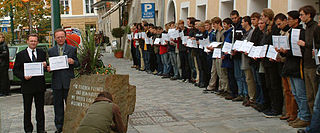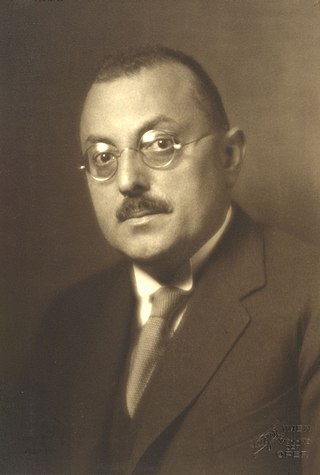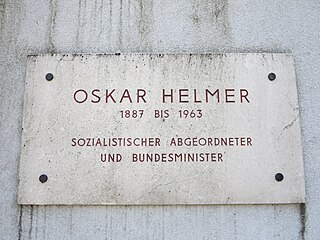
Braunau am Inn is a town in Upper Austria on the border with Germany. It is known for being the birthplace of Adolf Hitler.

Bruno Kreisky was an Austrian social democratic politician who served as foreign minister from 1959 to 1966 and as chancellor from 1970 to 1983. Aged 72, he was the oldest chancellor after World War II.

Andreas Maislinger is an Austrian historian and political scientist and founder and former chairman of the Austrian Service Abroad. He also is the founder of the Austrian Holocaust Memorial Award, the Braunau Contemporary History Days and the inventor of the idea of the House of Responsibility.

The Hitler birthplace memorial stone, a memorial to the victims of the Nazis, is placed in front of Salzburger Vorstadt 15, Braunau am Inn, Upper Austria, the building where Adolf Hitler was born in 1889.

The House of Responsibility (HRB) in Braunau am Inn is the idea of establishing an international meeting place and a place of learning in the birth house of Adolf Hitler. People from all countries, backgrounds, religions and cultures should meet in order to discuss, learn and develop projects revolving around the concept of responsibility relating to the dimensions of past, present and future. The main demography shall be young people. The idea for a House of Responsibility originates from the founder of the Gedenkdienst and chairman of the Austrian Service Abroad Dr. Andreas Maislinger.
Hans Sedlmayr was an Austrian art historian. From 1931 to 1932 and from 1938 onwards, he was a member of the Nazi Party.
Egon Ferdinand Ranshofen-Wertheimer was a diplomat, journalist and doctor of laws.
The Braunau Contemporary History Days are a series of conferences organised by the Association for Contemporary History. Scientifically guided by Andreas Maislinger, it has annually taken place in Braunau am Inn since 1992.
The Ludwig Boltzmann Institute of Human Rights is a Vienna-based research institute affiliated with the Austrian Ludwig Boltzmann Gesellschaft, that specializes in the area of human rights.

Robert Danneberg was an Austrian politician, a member of the Social Democratic Workers Party of Austria (SDAPÖ) and a prominent Austro-Marxist theoretician. Danneberg was one of the architects of Red Vienna and he was killed in the Auschwitz concentration camp in 1942.
The Department of Contemporary History of the University of Vienna is a scientific institution for the study of contemporary history. The headquarters of the institute is on the campus of the University of Vienna in the Alsergrund district of Vienna. It has about 30 scientific members, about half of them on the staff of the University of Vienna and the other half Privatdozenten who are assigned to the institute. The institute is run as a member of the association of the Vienna Wiesenthal Institute for Holocaust Studies.

The Social Democratic Party of Austria is a social democratic political party in Austria. Founded in 1889 as the Social Democratic Workers' Party of Austria and later known as the Socialist Party of Austria from 1945 until 1991, the party is the oldest extant political party in Austria. Along with the Austrian People's Party (ÖVP), it is one of the country's two traditional major parties. It is positioned on the centre-left on the political spectrum.

Michael Ludwig is an Austrian politician of the Social Democratic Party (SPÖ). Since May 2018, he has been Mayor and Governor of Vienna, the capital and largest city of Austria. Since January 2018, he has also served as chairman of SPÖ Vienna. Prior, he was City Councillor for Housing, Construction, and Urban Renewal from January 2007 until his election as mayor. He was also Second Deputy Mayor and Governor of Vienna from March 2009 to October 2010.
Heinz Magenheimer is an Austrian military historian known for advancing the discredited theory of a preemptive strike by the Wehrmacht against the Soviet Union.
Otto Probst was an Austrian political activist. He survived World War II, despite spending most of it in the Buchenwald concentration camp, followed by two years in a punishment battalion sent to support the war effort on the Russian front. After 1945 he became a mainstream Social Democratic politician, eventually serving between 1970 and his death in 1978 as Third President of the National Council ("Nationalratspräsident").

Erika Weinzierl was an Austrian historian, gender researcher, and historian of Nazism. A member of the Austrian People's Party and the Curatorium of the Austrian Mauthausen Committee, she was the second director of the Department of Contemporary History of the University of Vienna, succeeding Ludwig Jedlicka. Weinzierl was a recipient of the Austrian Decoration for Science and Art, the Preis der Stadt Wien für Geisteswissenschaften, the Benemerenti medal, and the Theodor Körner Prize.
Maria Mesner is an Austrian contemporary historian who heads the gender studies program at the University of Vienna. She is co-editor of the journal Österreichischen Zeitschrift für Geschichtswissenschaften and directs the Bruno Kreisky Archives.

Omas gegen Rechts is a Bürgerinitiative in Germany and Austria. Founded in Vienna in 2017, in protest at extreme right-wing political positions, a German initiative was founded in 2018. Its members are mostly women in retirement or close to legal retirement age, concerned about developments in politics and social life that they regard as detrimental to a future for their grandchildren. Omas gegen Rechts were awarded the Paul Spiegel Prize for civil courage by the Central Council of Jews in Germany in 2020.

Gerhard Karner is an Austrian politician currently serving as minister of the interior. From 2003, Karner was a member of the Lower Austrian state legislature. From 2003 to 2015, he was managing director of the People's Party of Lower Austria (VPNÖ). Following the 2015 mayoral election, he became mayor of Texingtal and retained this position until 2021.

Oskar Helmer (1887-1963) was an Austrian printer and social-democrat party politician. He served as the Minister of the Interior from 1945.











